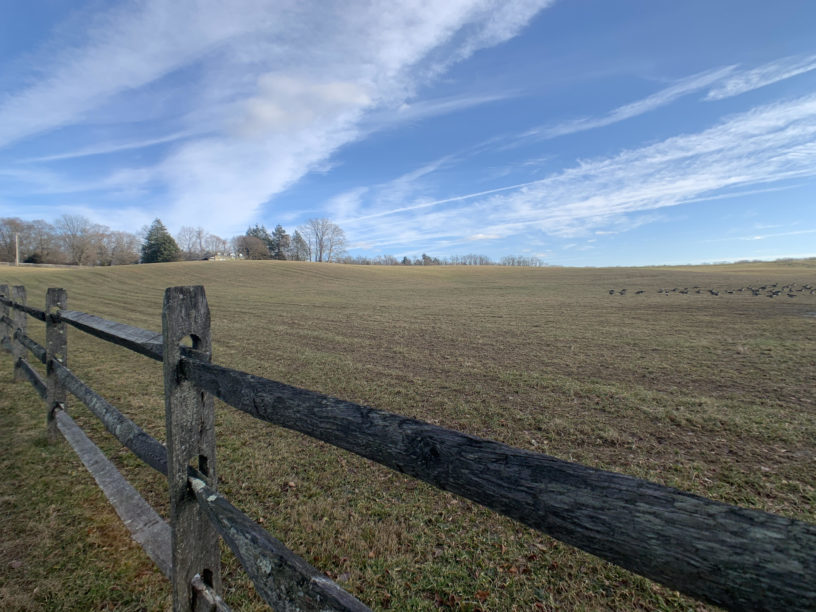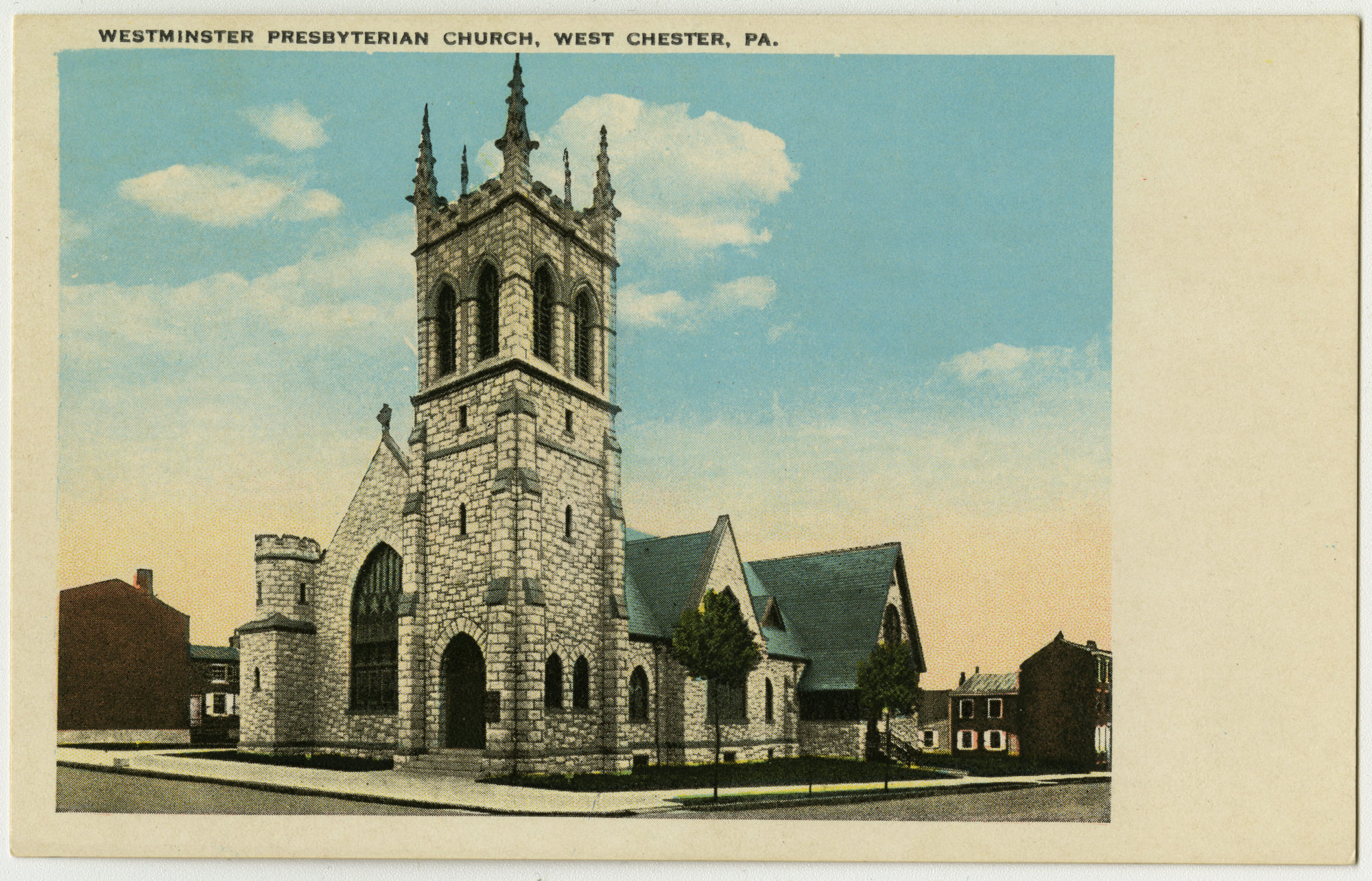It only takes a few minutes clicking around online to put together a perfunctory history of my hometown, West Chester, PA. For example: the Chester County Courthouse, situated in the heart of the borough, was designed by the architect behind the United States Capitol’s iconic dome. Bayard Rustin, the gay civil rights leader who co-organized the March on Washington and later turned conservative, was born and raised in West Chester. West Chester University, a state college with a decent party scene, calls the town its campus. Early episodes of “Jackass” were shot there.
But the West Chester I know doesn’t care much about this kind of history. Once, perhaps, this little burgh on the periphery of Philadelphia’s suburban sprawl would have claimed its own past, and there are still local historians who toil to maintain the records of the centuries-old borough. But for the 20,000 people who live here, the town’s past—and their own—isn’t as important as the history they craft for themselves, eschewing reality for the amorphous mythology of the red-blooded American middle class.
If you go to my hometown church, you will see church bells. But if you weren’t raised Christian, you might not know that church bells don’t really exist anymore. You will hear them chime, but when that call to worship sounds, look up at the severe metal pylons looming over the house of God, hoisting up what appear to be bells, and notice that all remains still, how pre-recorded sounds emit from a cluster of nearby electronic speakers. For church-goers, this is not an eerie juxtaposition, but a comfort; the mechanized workings of contemporary life become tolerable behind a thin veil of traditional imagery.
Such bells are a better image for West Chester than anything google might come up with. Like the other children born and raised in West Chester, I was used to these hidden, synthetic things. We played in man-made creeks flowing through cement tubes into man-made lakes. We sat in our Catholic school classrooms, praising an ancient God with worship songs written in the 1980s. We one-upped each other with tales of true grit during morning bus rides to private schools. This was how we grew up. Artifice was the law of the land.
I was born in 1997. My parents, an accountant and schoolteacher, moved to West Chester shortly before I was born, charmed with promises of a growing community, kind neighbors, and educational opportunities for their children. The covenant of suburbia was first drafted in the 1950s, but with each economic boom for the professional classes it is born again; my mother and father signed a mortgage agreement on a nice but modest house in a pretty neighborhood, and in doing so bought into its fiction. And in those days, it must have seemed fresh and exciting: a church community of young parents and their children, Little League practices, book clubs, and recently-built, affordable Catholic grade schools. And as a kid in elementary school, surrounded by my friends and neighbors, I was happy, curious, and satisfied.
West Chester looks different to me now, both in my childhood memories and when I return home. The notion that suburbia is an illusory veneer masking a hollow center is hardly original; it’s the underlying message of every Lifetime movie. But some clichés are realities, inhabited by flesh-and-blood human beings. This one is mine. When I was a kid, one thing always went unsaid in my church, at my dad’s work parties, at school functions: no one wanted to talk about their money.The richest families with the biggest houses kept mum about their paychecks and their success, and it was an untouchable taboo for a child, especially, to broach these subjects. Yet, the older I became—and the more I began to notice the obvious wealth differentials between my friends—the clearer it became that no one ever spoke of them.
What grown-up men did want to talk about was their childhoods, about roughing it in the woods and biking a paper route, in the good ‘ole days before cell phones and video games and cable. Never mind our current affluence, they seemed to say: we were tough once, and our parents were working-class (even if we aren’t now). At block parties in gated communities, middle-aged men would talk about nothing but their teenage years, their part-time jobs, and their college hijinks; I saw real-estate salesmen and insurance salesmen and every kind of salesman imaginable pretend that their love for Eagles football and their scars from childhood stumbles somehow made them exceptions in the world of the wealthy. It was an exceptionality they all shared.
I recall a high school friend who cherished every masculine ritual his father passed down to him: a love for cigars, a hardy Republicanism, an affinity for woodworking. These traditions weren’t just an inheritance, but a taking up of a symbolic mantle; he was perpetuating a lie that had been perpetuated by his father and grandfather. It assured him he could live comfortably while believing that he was not rich. It let him masquerade as a working man, and in this community, this fiction would go unquestioned and unopposed.
As all of these little fabrications blur together, they become a mesh of background noise, the routines of everyday life, in school, church, and home, that all prop up the interlocking denials that hold the town together. In a way, there’s nothing unique about it. But what is uniquely terrifying to me, especially now, is that no one can acknowledge they’re performing. In a little town like West Chester, everything—the storefronts, the sports fields, the sons and fathers—is there to reaffirm the fiction. And there is no contingency plan for the day when you might be forced to stop telling it.
There are exceptions to every rule; for me, the exception to the rule of masculine working-class cosplay was my father.
My dad plays by many of West Chester’s rules. He loves sports; he’s a proud handyman, and for the most part fits the masculine mold to a T. But what he doesn’t do is perform. When he tells stories of his working-class childhood, he tells them to my siblings and me, not to the neighbors. He’s been a wood-whittler for decades, but few people outside the family know it; he took up the hobby quietly to make personalized gifts for loved ones. In high school, he would laugh in disbelief when I told stories about my classmates.
In some ways, my dad also pushed me towards the faux-traditional culture of my town; I played sports in misery for years just to please him, to meet his expectation of what a son should be. I learned to feel disgust for my body—too weak, too fatty, not manly enough, not correct—in line with his critiques of my athletic failures. I struggled through the same punishing standards that my friends did.
But I also learned to be grateful that my father saw the hypocrisies of our neighbors. When I reached adulthood, my father’s model of quiet skepticism gave me a means to move on.

When I return to West Chester nowadays, I see the working-class affectations everywhere: $50,000 dollar pick-up trucks driven by blue jean-clad millionaires, half-finished woodworking projects left abandoned in suburban backyards, and the inescapable echoes of classic rock radio. Coming home from college in New York where such signifiers are immediately noticeable to a place where they are practically homogenous reminds me of my indeterminate position, caught in between my past and present.
During my visits home, I occasionally go out with friends from high school. We slide into a booth at Penn’s Table, or at a pizza joint in nearby Malvern. We grab drinks at Kildare’s. We talk about old times and catch up. It’s a communal rite practiced in some form by college students around the country.
I recently had a hungover brunch in a West Chester diner with these friends. The walls were covered with rock memorabilia: Hendrix, Morrison, the Stones. As I got up from our table to go to the bathroom, I looked around at the customers: white men in their late 30s, all wearing Eagles gear, glaring around the room authoritatively. The humor of the symbolic overkill wasn’t lost on me, but what really struck me was the ordinariness of it all. Here, in this place and time, all of these people and things were the standard; I was the odd one out.
Winter homecomings have always made me feel alienated like this, unsure of where I stand. Surrounded by holiday celebrations, goodwill towards men, and all that jazz, it can be hard to look for the underlying patterns that link people together. Sitting in the local park, peeking at bumper stickers and overhearing the dog-walkers’ chats, I still manage to find some of the performances, the little lies, in the same places I did as a child. Back then, I was discovering these contradictions anew; now, I wonder what it would take to change them. For the time being, though, I’m satisfied with knowing my home well enough to understand how it lies to me. My most earnest wish for West Chester is that it begins to understand how it lies to itself.
Thomas McGlone





